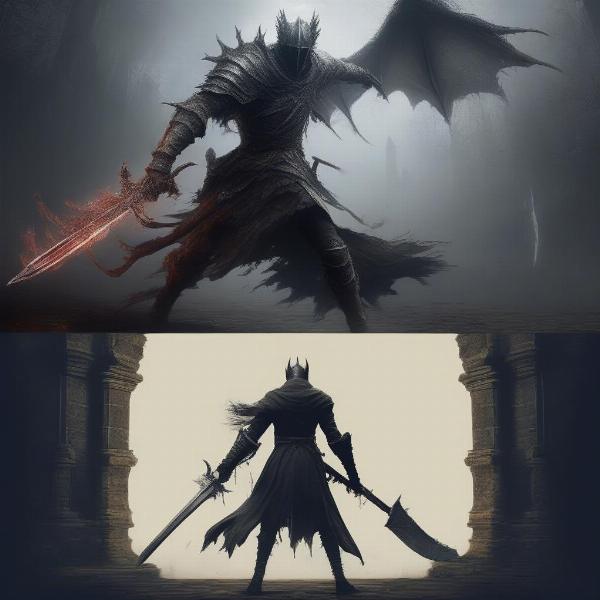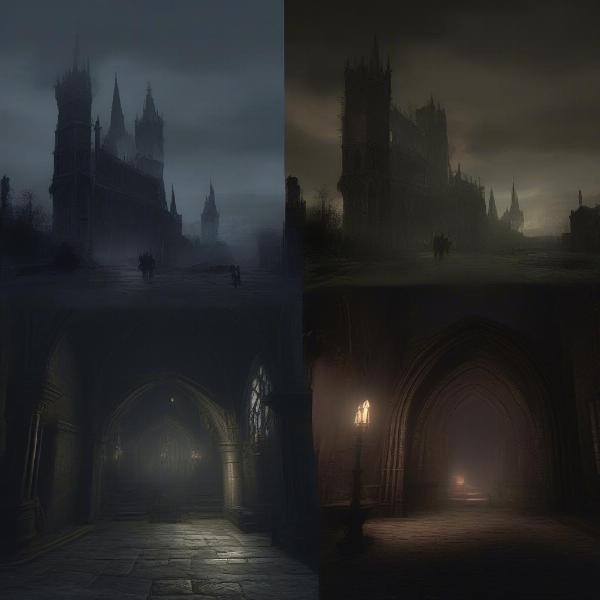Is Bloodborne A Dark Souls Game? It’s a question that echoes through the hallowed halls of gaming forums and whispers from the lips of seasoned players. While both games share striking similarities in their challenging gameplay, gothic aesthetic, and cryptic lore, the answer isn’t quite as simple as a yes or no. This article delves into the intricate relationship between FromSoftware’s critically acclaimed titles, exploring their shared DNA and highlighting the key differences that set them apart.
Unpacking the Soulsborne Connection
Both Bloodborne and the Dark Souls trilogy were developed by FromSoftware, led by the visionary Hidetaka Miyazaki. This shared parentage contributes significantly to the overlapping elements in their design philosophy. The core tenets of the “Soulslike” genre, characterized by demanding combat, intricate level design, and a sense of rewarding exploration, are present in both games. These mechanics aren’t just superficial similarities, they’re ingrained in the DNA of both series, fostering a sense of accomplishment through overcoming adversity. This shared philosophy is why the term “Soulsborne” often arises, grouping these titles together. But, is that grouping accurate?
Key Differences: Combat and Setting
While the underlying design principles are similar, Bloodborne distinguishes itself through faster-paced, aggressive combat. Unlike Dark Souls’ emphasis on shields and defensive play, Bloodborne encourages a more offensive approach. The rally mechanic, which allows players to regain lost health by quickly counter-attacking, promotes a dance of death with enemies, rewarding swift aggression. This shift in combat rhythm creates a distinct feel, separating Bloodborne from the more methodical pace of Dark Souls.
The setting also plays a crucial role in differentiating the two. Dark Souls immerses players in a medieval fantasy world, steeped in dragons, knights, and ancient prophecies. Bloodborne, on the other hand, plunges players into the gothic horror nightmare of Yharnam, a city plagued by a mysterious blood-borne illness. This Victorian-era inspired backdrop, with its Lovecraftian influences, creates a unique atmosphere, distinct from the dark fantasy of Dark Souls.
 Bloodborne vs Dark Souls Combat Styles
Bloodborne vs Dark Souls Combat Styles
Level Design and Narrative: Similarities and Divergences
Both games feature intricate, interconnected level design. Dark Souls often rewards exploration with shortcuts and hidden pathways, while Bloodborne’s labyrinthine city streets and gothic architecture create a sense of claustrophobic dread. While both excel in environmental storytelling, their narratives diverge. Dark Souls presents a fragmented narrative, allowing players to piece together the world’s history through item descriptions and cryptic dialogue. Bloodborne, while still retaining an element of mystery, offers a more focused narrative centered around the hunt and the city’s descent into madness.
“The level design in both games is a masterclass in interconnectedness,” says renowned game designer, Anya Petrova, PhD. “But the way they evoke emotion is distinctly different. Dark Souls instills a sense of loneliness, while Bloodborne cultivates dread.”
 Yharnam vs Lordran Environments
Yharnam vs Lordran Environments
Is Bloodborne a Spiritual Successor or a Separate Entity?
Bloodborne isn’t a Dark Souls game in the strictest sense. It’s not a sequel or a prequel, but rather a spiritual successor. It inherits the core DNA of the Soulslike genre, but molds it into something new and distinct. The faster combat, gothic setting, and more focused narrative carve out its own identity, setting it apart from its predecessors.
“Bloodborne isn’t just a reskinned Dark Souls,” adds Dr. Petrova. “It’s a unique experience that builds upon the foundations of the genre while forging its own path.”
The Verdict: A Blood-Soaked Cousin, Not a Direct Descendant
So, is Bloodborne a Dark Souls game? The answer is a nuanced no. It shares the same lineage, but it’s a distinct entity, a blood-soaked cousin, not a direct descendant. It takes the core principles of Dark Souls and reimagines them through a gothic horror lens, creating an experience that’s both familiar and utterly unique.
 Bloodborne's Unique Identity
Bloodborne's Unique Identity
Related Content: Exploring the FromSoftware Universe
Delving into the Lore of Dark Souls
Understanding the intricate lore of Dark Souls can enrich the experience. Explore the interwoven narratives, cryptic dialogues, and hidden item descriptions to unravel the secrets of Lordran and beyond.
Mastering the Art of Combat in Bloodborne
Bloodborne’s aggressive combat system demands precision and timing. Dive into advanced combat techniques, learn how to utilize trick weapons effectively, and discover the secrets to mastering the hunt.
The Influence of Lovecraft on Bloodborne
Bloodborne’s gothic horror atmosphere draws heavily from the works of H.P. Lovecraft. Explore the Lovecraftian influences in the game’s monsters, environments, and narrative.
Conclusion
While the question “is Bloodborne a Dark Souls game?” often arises, the reality is more complex. Bloodborne is a spiritual successor, sharing the same challenging gameplay and intricate level design but forging its own identity through its unique combat, setting, and narrative. It’s a testament to FromSoftware’s ability to innovate within a genre they helped define, offering players a distinct experience while retaining the core elements that make these games so compelling. So, embrace the hunt, venture into Yharnam, and experience the gothic horror masterpiece that is Bloodborne.
FAQ
- What is the main difference between Bloodborne and Dark Souls combat? Bloodborne emphasizes aggressive combat and rallying, while Dark Souls is more methodical and defensive.
- Are Bloodborne and Dark Souls in the same universe? While not explicitly confirmed, there are fan theories and subtle hints that suggest a potential connection.
- Which game is harder, Bloodborne or Dark Souls? Both games are challenging, but the difficulty depends on player preference and playstyle.
- Do I need to play Dark Souls before Bloodborne? No, Bloodborne stands alone as a unique experience and doesn’t require prior knowledge of Dark Souls.
- What is the meaning of “Soulsborne”? “Soulsborne” is a term used to collectively refer to the Dark Souls series and Bloodborne due to their shared gameplay mechanics and design philosophy.
- Why is Bloodborne considered a gothic horror game? The Victorian-era inspired setting of Yharnam, combined with Lovecraftian influences, creates a distinct gothic horror atmosphere.
- Is there a sequel to Bloodborne? Currently, there is no official sequel to Bloodborne.

